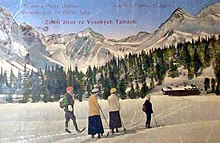Tourism
Tourism is go for delight; likewise the hypothesis and routine of visiting, the matter of drawing in, obliging, and enthralling sightseers, and the matter of working tours.Tourism might be global, or inside the explorer's nation. The World Tourism Organization characterizes tourism all the more by and large, in wording which go "past the regular view of tourism as being restricted to occasion action just ", as individuals "going to and staying in spots outside their typical surroundings for not more than one back to back year for recreation, business and other purposes"
Tourism can be residential or universal, and worldwide tourism has both approaching and active ramifications on a nation's equalization of installments. Today, tourism is a noteworthy wellspring of pay for some nations, and influences the economy of both the source and host nations, sometimes being of indispensable significance.
Tourism endured as an aftereffect of a solid monetary stoppage of the late-retreat, between the second 50% of 2008 and the end of 2009, and the episode of the H1N1 flu virus,yet gradually recouped. Worldwide tourism receipts (the travel thing to be decided of installments) developed to US$1.03 trillion (€740 billion) in 2011, comparing to an expansion in genuine terms of 3.8% from 2010.International vacationer landings surpassed the point of reference of 1 billion sightseers comprehensively without precedent for 2012,[6] that year in which China turned into the biggest high-roller in universal tourism all inclusive with US$102 billion, surpassing Germany and United States. China and developing markets, for example, Russia and Brazil had essentially expanded their spending over the past decade.
Etymology
 William F. Theobald (1994) suggested that "etymologically, the word tour is derived from the Latin, 'tornare' and the Greek, 'tornos', meaning 'a lathe or circle; movement around a central point or axis'. This meaning has changed in modern English to represent 'one's turn'. The suffix –ism is defined as 'an action or process; typical behaviour or quality', while the suffix, –ist denotes 'one who performs a given action'. When the word tour and the suffixes –ism and –ist are combined, they suggest the action of moving in a circle. Describing a circle implies returning to one's starting point, so a tour is a round-trip journey, i.e., the act of leaving and ultimately returning to the original starting point. Therefore, one who takes such a journey can be called a
William F. Theobald (1994) suggested that "etymologically, the word tour is derived from the Latin, 'tornare' and the Greek, 'tornos', meaning 'a lathe or circle; movement around a central point or axis'. This meaning has changed in modern English to represent 'one's turn'. The suffix –ism is defined as 'an action or process; typical behaviour or quality', while the suffix, –ist denotes 'one who performs a given action'. When the word tour and the suffixes –ism and –ist are combined, they suggest the action of moving in a circle. Describing a circle implies returning to one's starting point, so a tour is a round-trip journey, i.e., the act of leaving and ultimately returning to the original starting point. Therefore, one who takes such a journey can be called aInternational tourism expenditure[edit]
The World Tourism Organization reports the following countries as the top ten biggest spenders on international tourism for the year 2014.
| Rank | Country | UNWTO Region [22] | International tourism expenditure (2014)[23] | International tourism expenditure (2013)[24] | Market Share (%) | Change (2013 to 2014) (%) |
|---|---|---|---|---|---|---|
| 1 | Asia | $164.9 billion | $128.6 billion | 13.2 | ||
| 2 | North America | $110.8 billion | $104.1 billion | 8.9 | ||
| 3 | Europe | $92.2 billion | $91.4 billion | 7.4 | ||
| 4 | Europe | $57.6 billion | $52.7 billion | 4.6 | ||
| 5 | Europe | $50.4 billion | $53.5 billion | 4.0 | ||
| 6 | Europe | $47.8 billion | $42.9 billion | 3.8 | ||
| 7 | North America | $33.8 billion | $35.2 billion | 2.7 | ||
| 8 | Europe | $28.8 billion | $27.0 billion | 2.3 | ||
| 9 | Oceania | $26.3 billion | $28.6 billion | 2.1 | ||
| 10 | South America | $25.6 billion | $25.0 billion | 2.1 |
tourist.
Today, three schools discuss the roots of 'tourism'. The French School, led by A. Houlot, argues that the term 'tourism' comes from the old Aramaic Tur, which was used for the exploration and movement of people in the Bible. This word was used for the first time when Moses began his expedition to the lands of Canaán. Another school of thought, the Onomastic Sc
Significance of tourism
Tourism is an important, even vital, source of income for many regions and countries. Its importance was recognized in the Manila Declaration on World Tourism of 1980 as "an activity essential to the life of nations because of its direct effects on the social, cultural, educational, and economic sectors of national societies and on their international relations."[2][14]
Tourism brings in large amounts of income into a local economy in the form of payment for goods and services needed by tourists, accounting for 30% of the world's trade of services, and 6% of overall exports of goods and services.[5] It also creates opportunities for employment in the service sector of the economyassociated with tourism.[15]
The service industries which benefit from tourism include transportation services, such as airlines, cruise ships, and taxicabs; hospitality services, such asaccommodations, including hotels and resorts; and entertainment venues, such asamusement parks, casinos, shopping malls, music venues, and theatres. This is in addition to goods bought by tourists, including souvenirs, clothing and other supplies.hool, considers the origin of the concept not from a linguistic perspective but rather links it to the last name of the French aristocrat Della Tour. According to this school, after Carlos V signed a treaty with England in 1516, in celebration of this event, the future king gave the Della Tour family exclusive rights to conduct commercial transport and related businesses. A third school focuses on the Anglo-Saxon world, and scrutinises Theobald´s thesis. Surmising that the roots of the word 'tourism' lie in the ancient Anglo-Saxon term Torn, these scholars have found evidence that the term was coined in the 12th century by farmers to denote travel with an intention to return. Over the centuries, the meaning of the word has shifted. By the middle of the 18th century, English noblemen used the term 'turn' to refer to trips undertaken for education and cultural exploration. In reality, the purpose of the noblemen’s trips to the different parts of the kingdom was to acquire knowledge that was later useful for governing
| Rank | Country | UNWTO Region [22] | International tourist arrivals (2014)[23] | International tourist arrivals (2013)[23] | Change (2013 to 2014) (%) | Change (2012 to 2013) (%) |
|---|---|---|---|---|---|---|
| 1 | Europe | 83.7 million | 83.6 million | |||
| 2 | North America | 74.8 million | 70.0 million | |||
| 3 | Europe | 65.0 million | 60.7 million | |||
| 4 | Asia | 55.6 million | 55.7 million | |||
| 5 | Europe | 48.6 million | 47.7 million | |||
| 6 | Europe | 39.8 million | 37.8 million | |||
| 7 | Europe | 33.0 million | 31.5 million | |||
| 8 | Europe | 32.6 million | 31.1 million | |||
| 9 | Europe | 29.8 million | 28.4 million | |||
| 10 | North America | 29.1 million | 24.2 million |
